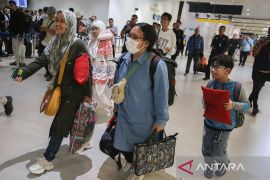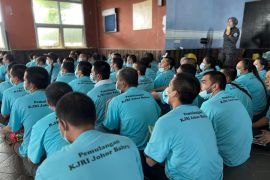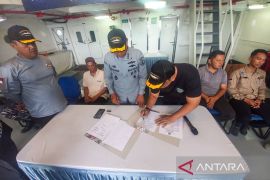"Former-ISIS combatants from Indonesia are liable to face legal proceedings and should be treated alike other terrorist convicts, who are imprisoned, but they are involved in a more systematic deradicalization program," the LP3ES researcher Adnan Anwar stated in Jakarta on Friday.
Anwar expressed agreement to the principle that they cannot be discharged by the state. Nonetheless, they have the right to return to Indonesia despite having left the country.
On the other hand, Indonesian authorities should segregate those travelling to Syria but then looking to return home, as they fell victims to the ISIS propaganda, from those departing for the conflict-torn nation to become ISIS fighters, he suggested.
"If they travelled to Syria, as they were influenced by the ISIS propaganda, they can be placed under the deradicalization program to again harbor nationalistic feelings in them for the Unitary State of the Republic of Indonesia," he explained.
However, he believes that a "soft approach" cannot be applied to former combatants since if they were permitted entry into Indonesia without the requisite treatment, they could potentially brainwash several people.
Despite Washington recently reveling in its alleged victory over the caliphate, claiming the group in Syria had been completely defeated, critical analysts, such as Sarah Hunaidi, still believe that "ISIS has not been defeated. It's alive and well in Southern Syria" (https://foreignpolicy.com, April 13, 2019).
Indonesia views the survey by the Setara Institute for Democracy and Peace on the perception of senior high school students in Jakarta and Bandung on tolerance, for instance, as a warning.
The survey conducted by Setara Institute on March 9-19, 2015, covering 684 respondents from 114 senior high schools, revealed that 49 students expressed their agreement to the ISIS Movement.
"Of the 516 respondents, who were aware of the ISIS, 49 agreed with the ISIS movement. Thus, at least one of the 14 students agreed with ISIS," the survey report indicated.
This survey outcome has triggered concerns over the rising support from young Indonesians for ISIS in the midst of news of several Indonesians having joined the ISIS battles in Iraq and Syria.
ISIS supporters in Indonesia had also launched a suicide bombing and shooting attack in Jakarta on January 14, 2016, which claimed eight lives, including killing three innocent civilians.
The incident adds to the list of lethal assaults by terror cells in Indonesia. During the period between 2000 and 2012, over a dozen attacks occurred in the capital city, including the Australian embassy bombing on September 9, 2004, and the JW Marriott and Ritz-Carlton hotel bombings on July 17, 2009.
Nevertheless, both the Indonesian government and people, seeking peace and harmony, have never bowed down to these notorious elements or given into their unfair demands.
Translator: Sigit P, Rahmad Nasution
Editor: Gusti Nur Cahya Aryani
Copyright © ANTARA 2019












